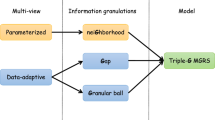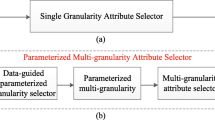Abstract
The notion of multi-granularity has been introduced into various mathematical models in granular computing. For example, neighborhood rough sets can derive a good multi-granularity structure by gradually changing the size of neighborhood radius. Attribute reduction is an important topic in neighborhood rough sets. However, in the case of multi-granularity, the challenge of high computational complexity and difficulty in synthesizing multi-granularity information when performing reduction algorithms always exists. To address such limitations, an accelerated algorithm for multi-granularity reduction is designed. Firstly, we construct a multi-granularity reduction structure with multiple different neighborhood radii to reduce the elapsed time of computing reducts. In this way, the consumed time of calculating the distance is similar to the one of single granularity reduction, and the elapsed time of computing multi-granularity reducts can be reduced. Secondly, multiple granularity information is integrated in each attribute evaluation. Finally, we evaluated the proposed method from multiple perspectives on 12 UCI datasets. Compared with other multi-granularity reduction algorithms, the proposed method not only generates reducts with relatively high quality, but also improves the time efficiency of multi-granularity reduction algorithm.





Similar content being viewed by others
Explore related subjects
Discover the latest articles, news and stories from top researchers in related subjects.References
Chen H, Li T, Cai Y, Luo C, Fujita H (2016) Parallel attribute reduction in dominance-based neighborhood rough set. Inf Sci 373:351–368
Chen H, Li T, Fan X, Luo C (2019) Feature selection for imbalanced data based on neighborhood rough sets. Inf Sci 483:1–20
Chen Y, Liu K, Song J, Fujita H, Yang X, Qian Y (2020) Attribute group for attribute reduction. Inf Sci 535:64–80
Chen Y, Qin N, Li W, Xu F (2019) Granule structures, distances and measures in neighborhood systems. Knowl-Based Syst 165:268–281
Cheng Y, Zhang Q, Wang G, Qing B (2020) Optimal scale selection and attribute reduction in multi-scale decision tables based on three-way decision. Inf Sci 541:36–59
Dai J, Hu Q, Hu H, Huang D (2018) Neighbor inconsistent pair selection for attribute reduction by rough set approach. IEEE Trans Fuzzy Syst 26(2):937–950
Fan J, Zhao T, Kuang Z, Zheng Y, Zhang J, Yu J, Peng J (2017) HD-MTL Hierarchical deep multi-task learning for large-scale visual recognition. IEEE Trans Image Process 26(4):1923–1938
Fang Y, Gao C, Yao Y (2020) Granularity-driven sequential three-way decisions: A cost-sensitive approach to classification. Inf Sci 507:644–664
Gao Y, Chen X, Yang X, Wang P, Mi J (2019) Ensemble-based neighborhood attribute reduction: A multigranularity view. Complexity 2019:1–17
García-torres M, Gómez-vela F, Melián-batista B, Moreno-vega JM (2016) High-dimensional feature selection via feature grouping: A variable neighborhood search approach. Inf Sci 326:102–118
Hu C, Zhang L, Wang B, Zhang Z, Li F (2019) Incremental updating knowledge in neighborhood multigranulation rough sets under dynamic granular structures. Knowl-Based Syst 163:811–829
Hu Q, Yu D, Xie Z (2008) Neighborhood classifiers. Expert Syst Appl 34(2):866–876
Jiang Z, Liu K, Yang X, Yu H, Fujita H, Qian Y (2020) Accelerator for supervised neighborhood based attribute reduction. Int J Approx Reason 119:122–150
Jiang Z, Yang X, Yu H, Liu D, Wang P, Qian Y (2019) Accelerator for multi-granularity attribute reduction. Knowl-Based Syst 177:145–158
Jing Y, Li T, Fujita H, Wang B, Cheng N (2018) An incremental attribute reduction method for dynamic data mining. Inf Sci 465:202–218
Ju H, Ding W, Yang X, Fujita H, Xu S (2021) Robust supervised rough granular description model with the principle of justifiable granularity. Appl Soft Comput 110:107612
Li J, Yang X, Song X, Li J, Wang P, Jun D (2019) Neighborhood attribute reduction: A multi criterion approach. International Journal of Machine Learning and Cybernetics 10(4):731– 742
Liang J, Wang F, Dang C, Qian Y (2012) An efficient rough feature selection algorithm with a multi-granulation view. Int J Approx Reason 53(6):912–926
Lin G, Qian Y, Li J (2012) NMGRS: Neighborhood-based multigranulation rough sets. Int J Approx Reason 53(7):1080–1093
Lin Y, Li J, Lin P, Lin G, Chen J (2014) Feature selection via neighborhood multi-granulation fusion. Knowl-Based Syst 67:162–168
Liu K, Yang X, Fujita H, Liu D, Yang X, Qian Y (2019) An efficient selector for multi-granularity attribute reduction. Inf Sci 505:457–472
Liu K, Yang X, Yu H, Mi J, Wang P, Chen X (2019) Rough set based semi-supervised feature selection via ensemble selector. Knowl-Based Syst 165:282–296
Ni P, Zhao S, Wang X, Chen H, Li C (2019) PARA: A positive-region based attribute reduction accelerator. Inf Sci 503:533–550
Qian J, Liu C, Miao D, Yue X (2020) Sequential three-way decisions via multi-granularity. Inf Sci 507:606–629
Qian Y, Liang J, Pedrycz W, Dang C (2010) Positive approximation: An accelerator for attribute reduction in rough set theory. Artif Intell 174(9-10):597–618
Qian Y, Liang J, Yao Y, Dang C (2010) MGRS: A multi-granulation rough set. Inf Sci 180(6):949–970
Rao X, Yang X, Yang X, Chen X, Liu D, Qian Y (2020) Quickly calculating reduct: An attribute relationship based approach. Knowl-Based Syst 200:106014
She Y, Li J, Yang H (2015) A local approach to rule induction in multi-scale decision tables. Knowl-Based Syst 89:398–410
She Y, Qian Z, He X, Wang J, Qian T (2021) On generalization reducts in multi-scale decision tables. Inf Sci 555:104–124
Shu W, Qian W, Xie Y (2020) Incremental feature selection for dynamic hybrid data using neighborhood rough set. Knowl-Based Syst 194:105516
Sun L, Wang L, Ding W, Qian Y, Xu J (2020) Neighborhood multi-granulation rough sets-based attribute reduction using lebesgue and entropy measures in incomplete neighborhood decision systems. Knowl-Based Syst 192:105373
Urbanowicz RJ, Meeker M, La Cava W, Olson RS, Moore JH (2018) Relief-based feature selection: Introduction and review. J Biomed Inform 85(July):189–203
Wan Q, Li J, Wei L, Qian T (2020) Optimal granule level selection: A granule description accuracy viewpoint. Int J Approx Reason 116:85–105
Wang C, Hu Q, Wang X, Chen D, Qian Y, Dong Z (2018) Feature selection based on neighborhood discrimination index. IEEE Transactions on Neural Networks and Learning Systems 29(7):2986–2999
Wang C, Huang Y, Shao M, Fan X (2019) Fuzzy rough set-based attribute reduction using distance measures. Knowl-Based Syst 164:205–212
Wang C, Huang Y, Shao M, Hu Q, Chen D (2020) Feature selection based on neighborhood self-information. IEEE Trans Cybern 50(9):4031–4042
Wu J, Song J, Cheng F, Wang P, Yang X (2020) Research on multi-granularity attribute reduction method for continuous parameters. Journal of Frontiers of Computer Science and Technology 61906078:1–10
Xu Y (2019) Multigranulation rough set model based on granulation of attributes and granulation of attribute values. Inf Sci 484:1–13
Xu K, Pedrycz W, Li Z (2021) Granular computing: An augmented scheme of degranulation through a modified partition matrix. Fuzzy Sets Syst 1:1–18
Yang T, Zhong X, Lang G, Qian Y, Dai J (2020) Granular matrix: A new approach for granular structure reduction and redundancy evaluation. Transactions on Fuzzy Systems 28(12):3133–3144
Yang X, Li T, Liu D, Fujita H (2020) A multilevel neighborhood sequential decision approach of three-way granular computing. Inf Sci 538:119–141
Yang X, Chen H, Li T, Wan J, Sang B (2021) Neighborhood rough sets with distance metric learning for feature selection. Knowl-Based Syst 224:107076
Yang Y, Chen D, Wang H (2017) Active sample selection based incremental algorithm for attribute reduction with rough sets. Transactions on Fuzzy Systems 25(4):825–838
Yao M X (2019) Granularity measures and complexity measures of partition-based granular structures. Knowl-Based Syst 163:885–897
Ye J, Zhan J, Ding W, Fujita H (2021) A novel fuzzy rough set model with fuzzy neighborhood operators. Inf Sci 544:266–297
Zhang X, Mei C, Chen D (2016) J. Li. Feature selection in mixed data A method using a novel fuzzy rough set-based information entropy. Pattern Recogn 56:1–15
Zhao H, Wang P, Hu Q (2016) Cost-sensitive feature selection based on adaptive neighborhood granularity with multi-level confidence. Inf Sci 366:134–149
Acknowledgments
The authors thanks editors and reviewers for their constructive comments and valuable suggestions. This work was supported by the Guangdong Basic and Applied Basic Research Foundation (No. 2021A1515011861), and Shenzhen Science and Technology Program (No. JCYJ20210324094601005).
Author information
Authors and Affiliations
Corresponding author
Additional information
Publisher’s note
Springer Nature remains neutral with regard to jurisdictional claims in published maps and institutional affiliations.
Rights and permissions
About this article
Cite this article
Li, Y., Cai, M., Zhou, J. et al. Accelerated multi-granularity reduction based on neighborhood rough sets. Appl Intell 52, 17636–17651 (2022). https://doi.org/10.1007/s10489-022-03371-0
Accepted:
Published:
Issue Date:
DOI: https://doi.org/10.1007/s10489-022-03371-0




